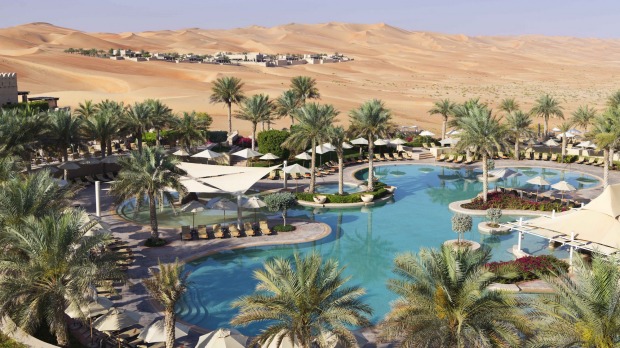
It doesn't take long for jaws to start hanging and the enamoured drooling to start. The approach road to the Qasr Al Sarab winds seemingly endlessly through golden, orange and red sand dunes. The serpentine windblown waves in the sand mesmerise, the glare of the sun on the rolling caps of the dunes feels like part of a fever dream. And then, to the right, a giant fortress straight from the fairytale picture books appears.
In Arabic, Qasr Al Sarab means "mirage palace", it's an apt description. Faux battlements and curving turrets line the exterior, while heavy, studded mahogany doors give way to bubbling fountains inside. It pulls no punches in going all out for the big-budget fantasy look, and thus it's rather fitting that it played a significant part in a rather better known big-budget fantasy.
The latest Star Wars film – The Force Awakens – was partly filmed in the dunes near the Qasr Al Sarab. Ask any member of staff about it, and you'll get some awkward shuffling and a mildly panicked face that oozes "agh! The confidentiality agreement!". Mercifully, the rest of Abu Dhabi's population isn't quite as circumspect. Everyone seems to know that the government gave the producers tax breaks to shoot in the emirate, and that the Qasr Al Sarab was block-booked by the cast and crew during filming. The smart money's on the dunes of the Empty Quarter taking over from the original Tunisian set as Luke Skywalker's home planet, Tatooine.
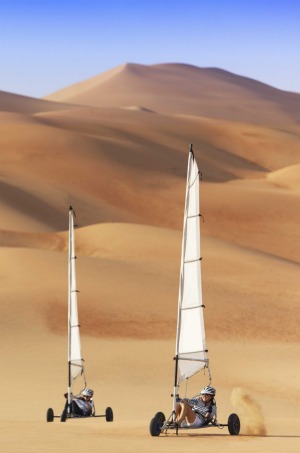
It's fair to say that this wasn't exactly a hardship posting. The Qasr Al Sarab is arguably the most audacious accommodation option in the UAE, the home of audacious accommodation options.
The setting, of course, is part of this. The dunes climb high around it, with a tiny oasis out in front. But they've not exactly scrimped on the interior decoration either. The "souk" may be just a normal resort shop with a fancy title, but bowls of herbs and spices, old pots and traditional metal tools outside provide the requisite atmospherics.
There's a strong emphasis on making Qasr Al Sarab an experience rather than a stay.
The rooms come with more of that rich, studded mahogany, plus heavy drape curtains, expensive-looking rugs and traditional woven ceilings above the bed. In the bathroom, massive egg-shaped bathtubs are built into the rounded turrets, separate shower cubicles have large benches for either sitting or shaving legs on and there's even a soap menu. Guests choose between cedarwood, vetiver, ginger flower or patchouli soap.
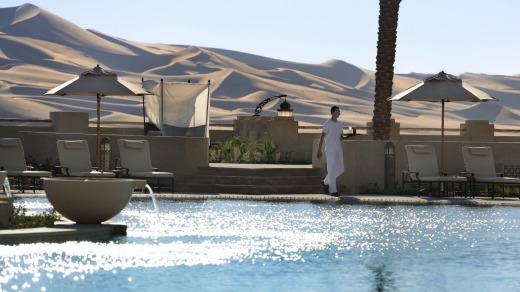
The garden terrace rooms also come with a ridiculously oversized terrace with enough sunbeds, seats and colourful padded benches to host a rugby team.
The activities list is also supersized. Options include falcon-heavy animal experiences, archery, sandboarding and dune-bashing four-wheel-drive tours. There's also desert sailing – which is basically yachting on sand, but with a sail attached to a kart rather than a boat – and fat biking where the mountain bikes are fitted out with extra-large, balloon-esque tyres to spread the weight over a larger surface area and make it easier to cycle on the sand. Not that much easier, though. Heading uphill requires a fair dash of momentum if you're not going to have to get off and push. Going downhill takes a delicate balancing of the brakes. A little tip: if you want your camera to work again, don't put it in your unbuttoned shirt pocket then fly over the handlebars for an undignified face plant.
The sunset camel safari is much safer territory. The richly comical, gangly beasts know exactly where they're going and have no interest in deviating from the usual route. They lumber with a frankly hilarious lack of grace, but when put against the backdrop it seems oddly right. The landscape is ultra cinematic.
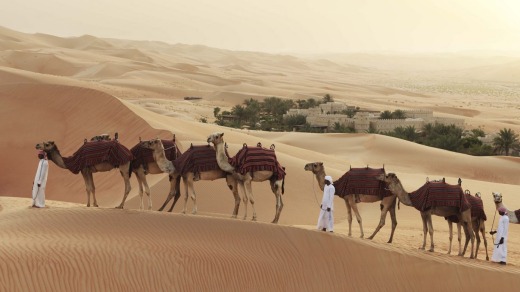
There's a strong emphasis on making Qasr Al Sarab an experience rather than a stay. Nowhere is this more true than the Al Falaj 'restaurant'. It's a gathering of borderline garish traditional Bedouin-style couches on top of rugs on the sand, where waiters bring out enormous mezze platters, then massive pots of barbecued meats. The food is excellent, but the meal is more than the food. The low-lit outdoor setting, with the fantasy dunes to the side, elevates it to the realm of something truly memorable.
For all the outlandish activities and showpiece experiences, however, it's the twists put on humdrum resort normality that makes Qasr Al Sarab feel special. A separate toaster for gluten-free bread at the breakfast buffet, for example. Or the "sunshine butlers" by the pool.
It's probably best to gloss over how responsible it is to have a massive freeform swimming pool in the desert, and these absurdly-named attendants do their very best to aid that glossing process. They dole out free bottles of water and mango smoothies, come round to spray cooling mists on your face and even give sweat-obscured sunglasses a tender clean. The Force is strong in these guys.
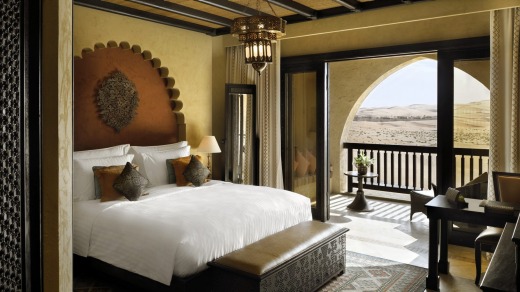
TRIP NOTES
GETTING THERE
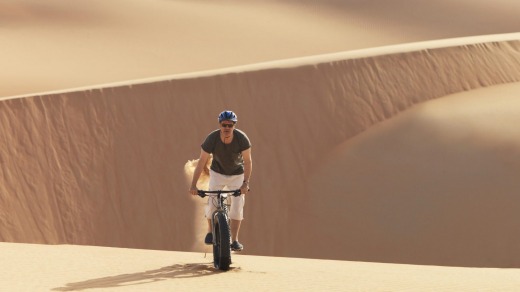
Etihad flies direct to Abu Dhabi from Sydney, Melbourne, Brisbane and Perth. See Etihad.com
The drive to Qasr Al Sarab takes about two hours, and the resort is happy to arrange transfers for those who prefer to avoid a hire car.
STAYING THERE
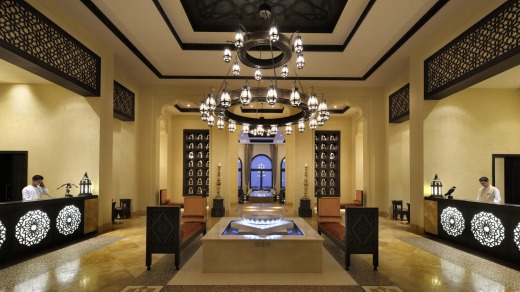
Rooms at the Qasr Al Sarab cost from $385 a night. See qasralsarab.anantara.com.